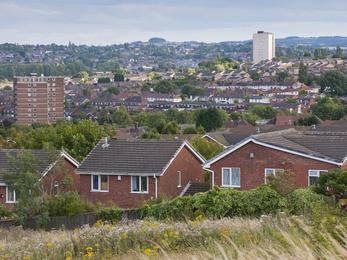When I was preparing to join The Wildlife Trusts in early 2020, I was really looking forward to getting out to the local Wildlife Trusts and meeting people working on the ground. Then just days before I was due to start, the first national Covid-19 lockdown was announced and instead – like many – I spent a significant period of time in my attic office, speaking to people online.
Although travelling further afield wasn’t possible, I found solace during the pandemic visiting my local Wildlife Trust nature reserves, as did many others. With more nature reserves across the UK than there are train stations or McDonald’s restaurants, around 60% of the UK population live within three miles of one of these nature havens. There’s no doubt that they helped many people to get through that difficult time. And today, these special places continue to provide a much-needed opportunity for people to connect with nature on their doorstep.
A voice for nature that’s only getting louder
Our purpose at The Wildlife Trusts is very much about bringing nature back everywhere, which includes to people’s doorsteps. It’s a message that clearly resonates – over the last five years we’ve gained 100,000 new members taking us to nearly 944,000 members overall. That’s more than double the size of the Labour Party and nearly nine times the size of the Conservative Party. If politicians aren’t paying attention to those numbers, they should be.
The worrying trend of nature-scapegoating
Despite the huge public interest in nature restoration, we’re seeing a worrying trend of nature being pitted against the economy by politicians.
Recent misleading soundbites about bats, newts and spiders holding up developments are factually wrong; it’s pathetic scapegoating.
The Corry Review that's been published this week is the sixth review into environmental regulations since 2010. These reviews always conclude the same thing – that there’s no big problem with the regulations and with a few tweaks here and there, they’re fine. As responsible developers show, the regulations are not holding up economic growth.
Time and time again politicians of all types apply the anti-nature rhetoric to our regulatory framework – but one review after another proves them wrong. Yet, successive governments continue to put pressure on our statutory agencies – Natural England and the Environment Agency – and constantly undermine them, making it harder for them to do their job.
It’s absolutely true that the housing crisis must be tackled. But tackled by building new homes with high environmental standards. They need to be energy and water efficient, help us adapt to climate change and provide new nature space alongside, so that we can give people a greener, healthier and more affordable future.
We’ve only five years left to meet legally binding commitments to restoring 30% of nature by 2030, and time is fast running out to ensure we all benefit from a healthy and sustainable economy with nature at its heart.





